Is Shrimp Healthy for Dogs to Eat? The Complete Dog Parent’s Experience

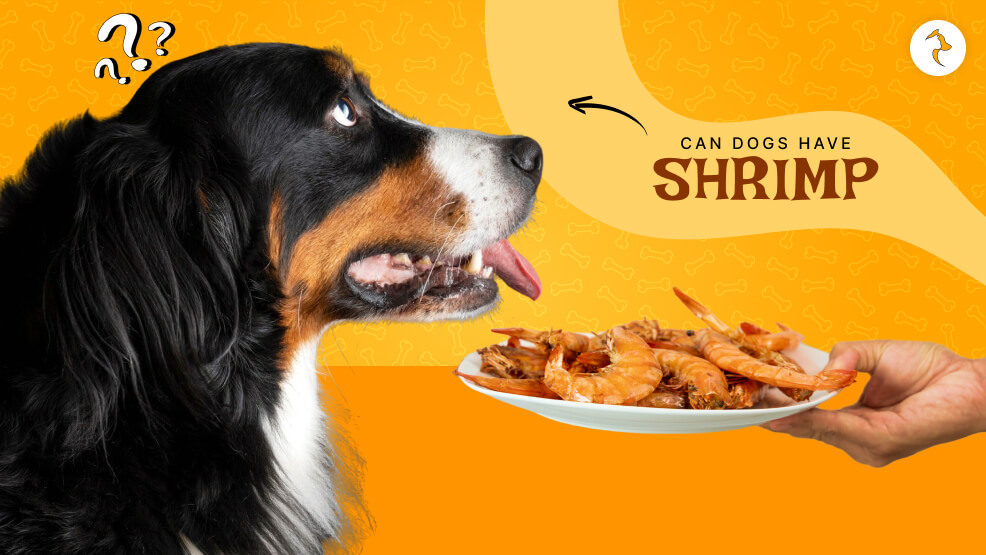
Shrimp is a delicious and favorite seafood, typically in various dishes from salad to scampi shrimp. As a dog owner, you might have wondered if it’s safe to share some of this delicious food with your dog.
Dogs are meat-eaters; naturally, you would want to give them a little of what you’re eating. But when it comes to shrimp, there is something to consider.
In this article, we discuss the advantages, disadvantages, and safety issues of giving shrimp to your dog. After you’ve read all of this, you’ll know it all there is that you’ll ever need to know about making an intelligent decision on whether or not your dog should eat shrimp.
Can Dogs Have Shrimp?
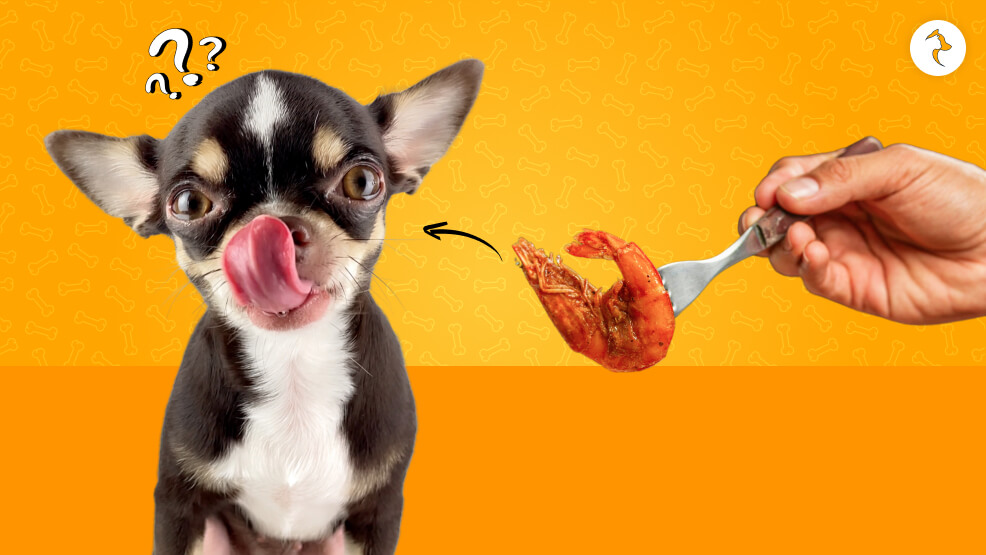
Yes, shrimp is canine cuisine, but, once again, like with every one of the foods, it must be eaten in moderation and cooked.
Shrimp is low in calories but high in protein value and loads up with essential nutrients like iodine, selenium, and vitamin B12. If the quantity your dog consumes is moderate, then the body gets ample.
There is one thing that simply demands investigation before including shrimp in their food in your plan.
Shrimp can be a great blessing for your dog in numerous ways if well cooked and prepared:
1. Great Protein Source
Shrimp is a great protein source—a great ingredient in dog food. Protein fixes and builds tissue, maintains muscular movement, and supports healthy nails, coat, and skin. Shrimp can be applied to work dogs and high-protein dog breeds.
2. High in Nutrients
In addition to protein, shrimp contains other nutrients in the form of vitamins and minerals:
- Vitamin B12: Stimulation of nerves and used in red blood cell synthesis.
- Iodine: Regulates thyroid activity and proper metabolism.
- Selenium: An antioxidant that may maintain the immune system in function.
- Phosphorus: Maintains bones and teeth in good health. These will be healthy and good for the health of your dog.
3. Low in Fat and Calories
Shrimp is a protein with zero fat, making it an ideal diet for heavy or low-calorie dogs. It is a complete, filling source of protein with no calories other than most of the fat in meat.
4. Help Keeping Coat Healthy
The fat and protein of the shrimp can be utilized as a source of nourishment for the dog’s coat.
The omega-3 fatty acids in the shrimp may be necessary to make your dog’s coat silky, healthy, and shiny. Hard, dry-coated dogs can be supplemented with shrimp.
Possible Danger of Feeding Shrimp to Dogs
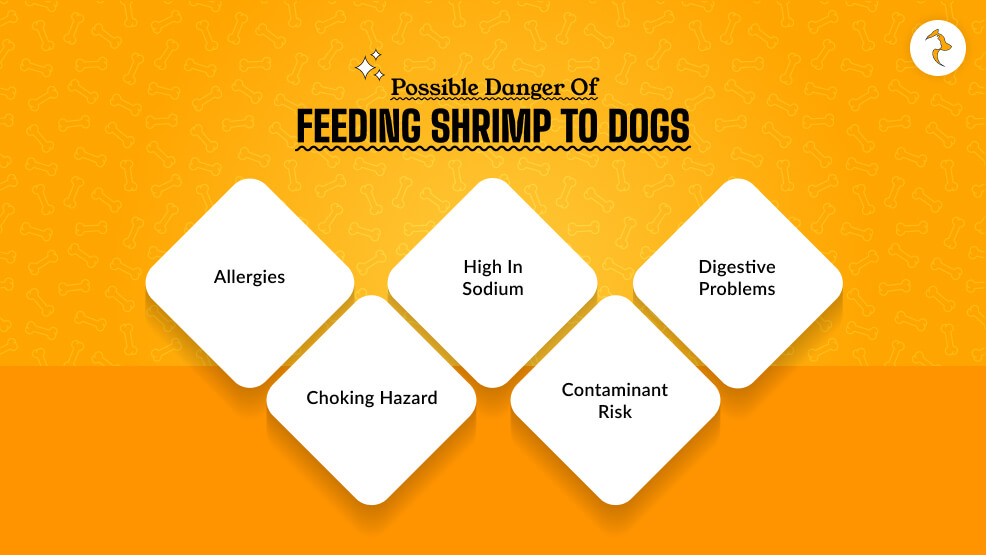
Although the shrimp on your pet’s food as an ingredient would be nutritious when taken in infinitesimal amounts, precautions to take are:
1. Allergies
As dogs are also human beings, food allergies are not unfamiliar to them, and the most researched food allergen in dogs is shrimp.
If the resident pet dog has never consumed shrimp in their lifetime, then feed them with small amounts and observe whether they have any indication of a food allergy. Symptoms of shrimp allergic reaction are:
- Vomiting
- Diarrhea
- Rash or itchy skin
- Swelling of the face or paw
- Pawing or lip licking chronically. If your pet animal is engaged in the above, discontinue giving your pet animal shrimp and call your vet.
2. Choking Hazard
Shrimp are very small and are one of the choking hazards in a dog, primarily if the dog itself is small. Take care not to remove the shell, tail, and legs while giving your dog shrimp because they will surely choke your dog.
Alternatively, when initially feeding a dog shrimp, ensure you chop the shrimp into little pieces to ensure that it will not cause your dog to choke.
3. High in Sodium
Shrimp is salty and toxic to dogs if consumed in large amounts. Excess salt can cause dehydration, hypertension, and kidney disease.
If you are feeding your dog shrimp, ensure it is not salted, rested, or stale. Shrimp salads or cooked in a heavily salted sauce are not covered.
4. Contaminant Risk
As with the rest of the seafood, shrimp can be infected with toxins or dirt during processing in dirty water. Imported alongside some of the native shrimp that are produced can contain lethal pesticides, antibiotics, or heavy metals. As a safety measure, employ wild-caught shrimp from a trusted source because there is not much filth.
5. Digestive Problems
Shrimp, especially raw shrimp, will make some dogs scurry with stomach illness. Shrimp legs, shrimp tails, and shrimp shells are not digestible to a dog.
So do not feed these to your dog. Also, in small quantities only, it will avoid nausea, vomiting, or diarrhea in your dog. Feed too much.
How to Feed Shrimp to Your Dog Safely
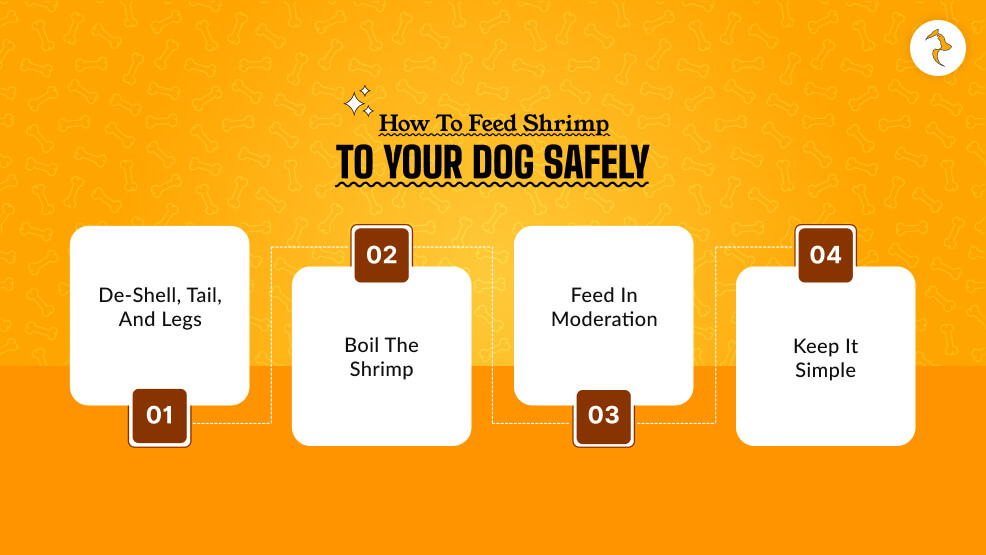
If it is not possible to avoid feeding shrimp to your dog, then caution must be exercised to feed it safely:
1. De-Shell, Tail, and Legs
Always throw away the shells, tails, and legs before serving them to your dog. Shells, tails, and legs are tough, can be a choking hazard, and help upset your dog’s stomach.
2. Boil the Shrimp
Do not give your dog raw shrimp. It harbors lethal bacteria and parasites, such as Vibrio or Salmonella, that can kill your dog.
Always properly cook the shrimp before giving it to your dog. Steam, boil, or grill the shrimp, but never add oils, butter, or spices, particularly garlic or onions, because they are toxic to dogs.
3. Feed in Moderation
Even shrimp is okay, but do not overfeed. One or two shrimp bites as an extra treat are best because shrimp contains a lot of cholesterol. Too much shrimp will give your dog a stomachache or make him fat incorrectly.
4. Keep it Simple
Steer clear of garlic, onion taste, salt, or some poisonous chemical for dogs. Shrimp will be fresh and clean and plain and will be offered to your dog.
What If Your Dog Has Overeaten Shrimp?

If your dog has overeaten shrimp, then he will be suffering from some of the following belly problems:
- Diarrhea
- Vomiting
- Bloating
- Gas.
If so, carefully watch your dog for illness and give him as much fresh water as he can stand to dry out. If so and persists or in a white dog that is tighter than normal, your veterinarian must be called again.
Is Shrimp Safe for Dogs?
Shrimp as a dog treat is balanced when consumed occasionally and correctly prepared. Shrimp possess a lower calorie content but a higher protein, vitamin B12, iodine, and selenium content.
Though that is so, there are some overuse risks of shrimp, including shrimp allergy, choking hazard, and possibly lethal contaminants. Therefore, shrimp should be used cautiously as a remedy for dogs.
To safely feed your dog shrimp, boil the shrimp, peel its shell, and only consume a little bit of it. Never season and never put something on top of it.
Poisonous food, such as onions, garlic, or excessive salt. Feed a little of it first and monitor if there is an allergic reaction if the dog has never heard of or seen a shrimp.
As with any fresh food, you should already have notified your vet before feeding the shrimp as part of your dog’s dinner if your dog already has an illness. Your dog and family can then go ahead and reward themselves with this good treat and a healthy family dinner.








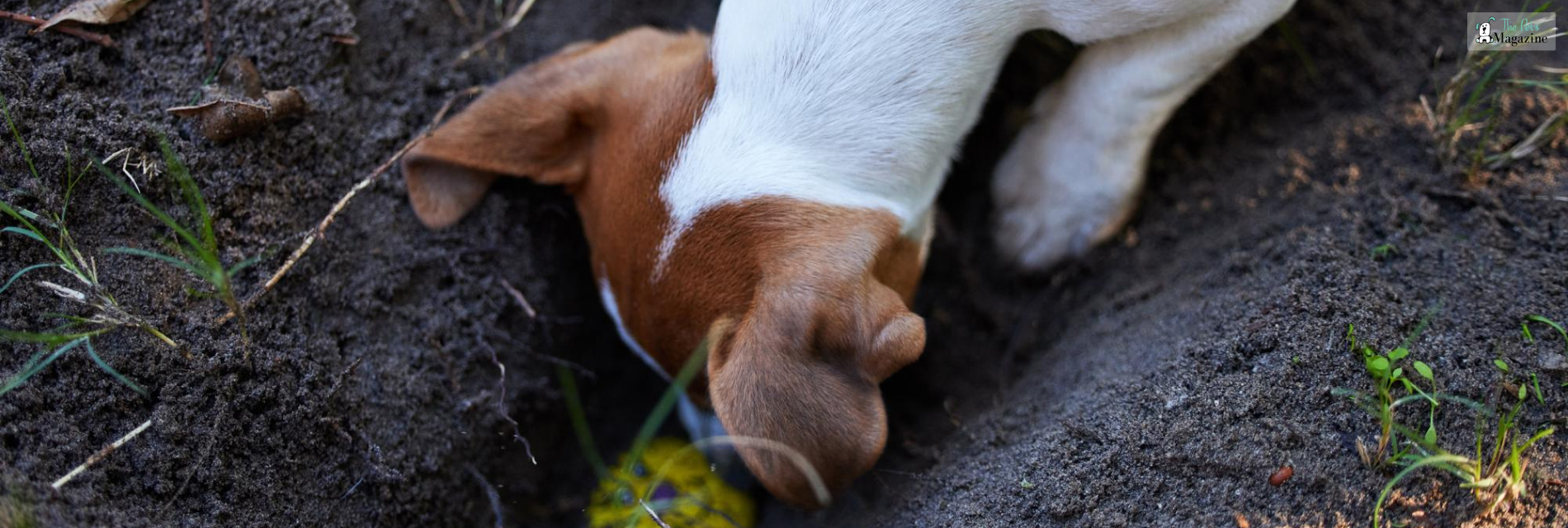
Leave A Comment